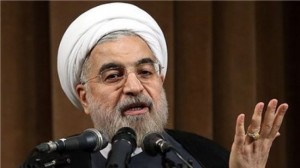 Any deal also has to be approved by Ďother power holdersí in the regime, says Norman Lamont.
Any deal also has to be approved by Ďother power holdersí in the regime, says Norman Lamont.When†Hassan Rouhani†took office in August, film-maker Hossein Dehbashi made a political video setting the Iranian presidentís eloquent inauguration speech to music. The speech emphasised tolerance, compassion and the need to remove ďbitterness from our heartsĒ.
The video went viral but it pushed the frontiers of what was acceptable, since some of the musicians and singers were female. Nonetheless, Mr Rouhani put it on his website. What happened next was less edifying. The home of Mr Dehbashiís parents was defaced by thugs on motorcycles who wanted to silence him.
That Mr Rouhani faces domestic opposition should surprise no one. At home he is likely to find it hard to make rapid progress on the issues of personal freedom he highlighted in the election. On the international stage, success is by no means guaranteed on the crucial issue of nuclear negotiations.As the west, and the US Senate in particular, debates the wisdom of engaging with Iran is important to remember just how precarious Mr Rouhaniís position is Ė and the dangerous consequences of failure to reach agreement in the nuclear negotiation.
If the outcome of the nuclear negotiations were left to members of Mr Rouhaniís cabinet, which boasts more American PhDs than that of US President Barack Obama, the chances of success would be high. Yet on a recent visit to Tehran with UK parliamentary colleagues Ė where we met senior officials, including Mohammad Javad Zarif, foreign minister and his chief negotiator in Geneva, as well as the head of the presidentís office and an adviser to the supreme leader Ė it was made clear that any deal would have to be approved not just by the government but by ďother power holdersĒ in the regime as well.
This presumably includes the Supreme Leader, Ayatollah Khamenei, members of parliament and the commanders of the elite Revolutionary Guards.
Some opposition is self-interested. Mr Rouhani recently pointed out that regime insiders have done well out of†sanctions, while pistachios have become unaffordable for ordinary people. But each night in my hotel, local television showed Ayatollah Khamenei denouncing the ďGreat SatanĒ while his audience chanted ďDeath to AmericaĒ. Which, I wondered, was the real Iran; the vast crowd or US-educated ministers?
Examination of the text of the supreme leaderís speech revealed plenty of small print. Similarly Ayatollah Khatami, the firebrand cleric, leaning on an AK47 at†Friday†prayers, denounced America but praised Iranís nuclear negotiators as ďsons of the revolutionĒ.
Ayatollah Khamenei gave his permission for the talks but has voiced scepticism about the outcome. Distrust of the west, and of Britain, runs deep and wide. History provides considerable justification for that.
Ministers told us a tough issue in the next stage of the talks will be to reach ďa mutually agreed definitionĒ, as the Geneva agreement puts it, of the scale of any nuclear programme. The west wants the enrichment programme to be limited so that Tehran cannot ďbreak outĒ to build a nuclear weapon on a timescale insufficient for the west to react. Mr Zarif called this a ďvast problemĒ.
Transparency and the right to inspect undeclared facilities will be vital. Encouragingly, the interim agreement in Geneva imposes the most intrusive inspection regime ever. But calls from Israel and some US Republicans for the entire nuclear programme to be dismantled are unrealistic.
There is too much pride at stake: Iran wants to show that an Islamic country need not be backward scientifically. For this reason, Mr Zarif stressed that the issue of allowable research and development will be problematic.
Suggestions that more sanctions will cause Iran to dismantle the programme are unrealistic. Before sanctions, Iran had fewer than 200 centrifuges. Today, it has nearly 20,000. More sanctions will lead to what hardliners want: a siege economy and more control over the citizen. The Iranian public blames the west for sanctions and is bitter about ineffective concessions for humanitarian goods, such as medicines. If the US Senate imposes more sanctions, as it might, the negotiations will be dead.
A nuclear deal is worth having on its own, even if it does not lead to a wider improvement in relations. Sanctions were imposed only to counter the nuclear programme.
A Middle East without a nuclear-armed Iran is in the interests of Israel and Saudi Arabia, and will be†safer. If the deal fails, the programme†will be constrained by nothing more than by the threat of military action.
If there is a deal, Iranís relations with the US and Britain may improve only gradually. But an Iran that is open to foreign investment will be more open to influence. This will shape the evolution of a post-revolutionary Iran and could change the country. That, of course, is what the hardliners most fear.
†This article was written by†Norman?Lamont †for the opinion page of the Financial Times on†February 2, 2014.The writer was UK chancellor of the exchequer from 1990 to 1993 and is chairman of the British Iranian Chamber of Commerce
The Iran Project is not responsible for the content of quoted articles.










